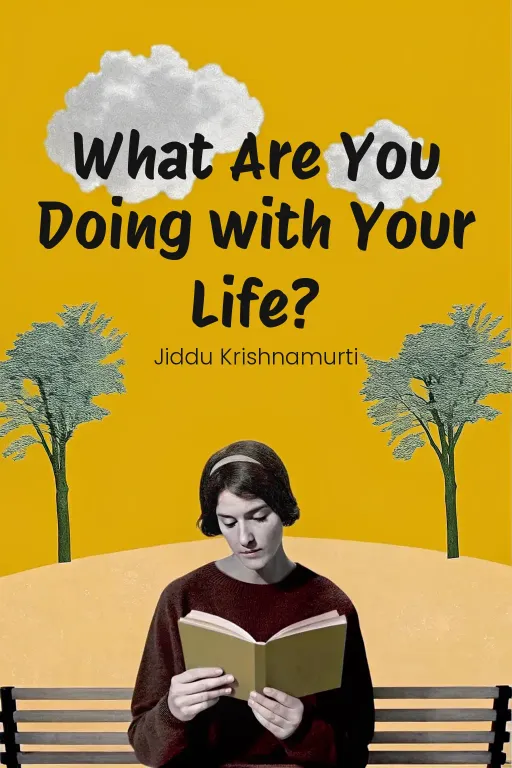
Love Yourself First: Thrive, Don't Just Survive
Podcast by Beta You with Alex and Michelle
How the Simple Act of Self-Love Can Transform Your Life
Introduction
Part 1
Alex: Hey everyone, welcome back to the show. Today, we’re diving into something fundamental, something that honestly, can change everything: self-love. But, we're not talking about pampering sessions or bubble baths; we’re talking about a really deep, transformative kind of self-love. Michelle: Okay, Alex, I’m listening. But let's be real. In this crazy world, with work, relationships, social media constantly demanding our attention, who has the time to just sit around and "love themselves"? Isn’t this just another one of those self-help industry gimmicks? Alex: I get your skepticism, Michelle. But that's why I’m excited about this book “Love Yourself Like Your Life Depends on It” by Kamal Ravikant, which dares to take a very different approach. Ravikant basically says that self-love isn’t just a luxury, it’s essential. It’s foundational for everything – your happiness, your resilience, and how you navigate life's inevitable challenges. Michelle: Alright, so what makes this any different from the usual "manifest your best life" stuff? Alex: Good question. This book isn’t about airy-fairy thinking. Ravikant gets really raw and shares his own journey. He talks about how he pulled himself out of a really dark place. The tools he used were simple, but they were powerful mental and emotional resets. He sees it as a continuous journey, not some quick fix. Michelle: Okay, you've piqued my interest, I admit. So, what are we going to unpack for our listeners today? Alex: We’ll explore three key ideas. First, we’ll look at the fundamental importance of self-love and why it’s essential as a foundation for a good life. Then, we’ll get into some of Ravikant’s rituals – things like mental loops and mindful questions that can help you actually practice self-love, step-by-step. And finally, we’ll tackle those barriers – fear, doubt, setbacks– that keep so many people from truly embracing self-love. I see these barriers not as roadblocks, but as doors waiting for us to unlock them. Michelle: Ambitious! Now, if any of these "rituals" make me feel ridiculous, I'm holding you accountable Alex. Alex: Deal! Let’s dive in and see why Ravikant believes that self-love isn’t just a worthwhile pursuit, but that it's something your very life depends on, truly!
The Foundation of Self-Love
Part 2
Alex: Okay, so let's dive in. Why does Ravikant frame self-love as absolutely essential, you know? He's not just saying it's a nice-to-have, or some trendy thing. He's saying it's crucial for getting through life, especially when things get tough. Michelle: Right, but I'm trying to wrap my head around this. Why start with self-love? Can't people just, you know, fix their external problems? Like get a better job, sort out their relationships, or finally make it to the gym? Why does it have to begin inward? Alex: Because everything truly starts and grows from the relationship you hold with yourself. Ravikant really emphasizes that if you don't love yourself, your ability to handle difficulties just plummets. Think of it like the base of a pyramid. If that foundation is shaky, anything you build on top – whether it's achievements, relationships, or routines – everything's going to feel unstable. And listen, self-love isn't about ignoring your problems; it's about giving yourself the strength to face them head-on without sabotaging yourself in the process. Michelle: That’s a pretty profound claim. By the way, his own story is kinda…intense. Startup failure, heartbreak, losing a close friend – not exactly a walk in the park. Can this approach actually work for someone whose struggles might not seem so, well, catastrophic? Alex: Absolutely, it can. Ravikant’s, you know, "aha" moment came during a really dark time for him, that's true. But the core ideas he shares? They apply to everyone, really. What's really powerful is the urgency he brings to it. He doesn't sugarcoat things or suggest waiting until it feels convenient. For him, self-love is non-negotiable, no matter what level of difficulty you're facing. Think of it as like, putting on armor, not to hide from the world, but to face it with more confidence, clarity and, most importantly, kindness towards yourself. Michelle: Okay, so let's talk about this vow he makes: "I will love myself." What makes that any different from, say, those New Year's resolutions we've already forgotten about by mid-January? Alex: It's about the intention behind it, Michelle. When Ravikant made that vow, he didn't just say it once and hope for some kind of miracle. You know, it became this constant theme in his life. He repeated it over and over – out loud, to himself, in his head – really embedding it into his thoughts. Ravikant describes it as this lifeline, something he clung to again and again until it started to change how he saw himself. Michelle: So, it’s not just about saying the words; it’s about living them. Alex: Exactly! He treated it like a practice, you know? Like training for a marathon. Every day you run a little farther, build up your endurance. Ravikant did that mentally. Self-love became a ritual for him. And the brilliance of it is in its simplicity: whether he was lying in bed, gazing out a window, or even just brushing his teeth, he wove that vow into his daily life. Michelle: Hold on a second. Because I have a question. When you're completely overwhelmed – emotionally shut down, questioning everything – how do you even begin to believe, let alone practice, something as big as "loving yourself"? Alex: Great point! And Ravikant talks about this too. He didn't fully believe it at first. The vow wasn't about instantly transforming into someone new. It was about showing up every single day, even when your doubts are screaming louder than your faith. Think of it like planting a seed: each repetition, each little bit of effort, is like watering that seed and giving it sunlight. And, over time, those mental pathways shift and get stronger. Michelle: So, it's less about believing it initially and more about committing to it. Kind of like saying, "Okay, I might not feel it now, but I'm going to start acting as if it could be possible." Alex: Exactly! Actions really can influence emotions, not just the other way around. Ravikant even describes how negative thoughts just swirled around him back then. He didn't magically switch them off overnight, of course. But by introducing this idea of self-love into all that noise, he created kind of a balance. Slowly, those self-critical voices started to lose their power in his mind. Michelle: Hmm. Okay, but let’s address the pushback, right? Some people might think, "That's a nice idea, but it's just not realistic for my life." Alex: That's what’s so good about Ravikant’s approach: it’s seriously practical. He figured out how to weave self-love into life without making it complicated. It's not about having to find an hour to meditate or journal endlessly, although those things can help. It's about adding small, repeatable actions: whispering "I love myself" when you're doing something really mundane, like waiting for coffee or walking to work. Anybody can do that. Michelle: Right, so it’s like background music for your brain—you play it softly at first, let it hum in the background, and eventually, it becomes a soundtrack to your day. Alex: Exactly. What started as murmurs for Ravikant became part of his natural responses. And it's important to remember, self-love doesn't mean denying hard feelings or pretending everything's perfect. Ravikant's story shows he still dealt with loss, uncertainty, and setbacks. The real difference was how he reacted: with kindness instead of criticism. Michelle: So, self-love isn’t about drowning out the negativity with false cheer—it’s about neutralizing it with genuine care. Alex: Yes! And Ravikant says this shift was transformative. Start small, stick with it, and it begins to spread. He felt not just personal growth, but also how his relationships changed, and even how he approached work. Michelle: Let’s hold onto that ripple effect for a minute—because the idea that self-love radiates outward makes this a lot bigger than just “feeling better about yourself.” It could impact how we connect with others, how we deal with conflict, even how we make decisions. Alex: Exactly. Loving yourself isn't selfish. It's the very thing that lets you show up better.
Practical Tools for Cultivating Self-Love
Part 3
Alex: So, that foundational piece naturally leads us to practical methods for cultivating self-love, right? And Ravikant really gives us a whole toolkit to make it real. Building on this, the methods include things anyone can do—mental loops, meditation, mirror work, and reflective questioning. Each of these offers concrete steps to, you know, help self-love become part of your daily life, not just some abstract idea. Let’s break them down, starting with mental loops. Michelle: Mental loops. Sounds like something you'd hear in a neuroscience lab. What's the actual concept here? Alex: It's actually pretty straightforward. Ravikant explains that mental loops are a way to reprogram your subconscious by replacing negative thought patterns with affirmations. In other words, it’s not about stopping the negative thoughts—that’s almost impossible—but about overriding them with intentional, positive ones. You repeat a simple phrase: “I love myself.” Over and over, until it becomes ingrained. Michelle: Like turning a broken record into your favorite playlist? But I’m going to ask the tough questions here—how do you avoid it feeling forced or, frankly, silly? Whispering “I love myself” on repeat sounds… well, let’s just say it's a hard sell for folks drowning in doubt or cynicism. Alex: Totally valid, and Ravikant even felt that way too when he started. He admits it felt awkward, mechanical in the beginning. But that’s where consistency comes in. Over time, the repetition starts to feel natural. It’s as if your mind slowly starts accepting what you’re telling it. Ravikant used these loops constantly—while walking, brushing his teeth, or waiting for his phone to charge. Small moments, but cumulatively, they rewired his internal dialogue in a major way. Michelle: Sounds a bit like building a muscle. You’re not lifting emotional heavyweights from day one, but you keep at it, and you eventually gain the strength. Alex: Exactly. And there’s science to back this up. Cognitive-behavioral therapy, for example, works off a similar principle, replacing destructive thought cycles with constructive ones. Ravikant’s mental loops are like an accessible, DIY version of that—no therapist required. Michelle: Alright, so it’s about persistence. But what’s next? I believe meditation was another big piece, how does that fit into this map for self-love? Alex: Okay, so meditation is about anchoring yourself in the present. Ravikant ties that to self-love by focusing on the affirmation “I love myself” during the practice. So instead of just breathing and clearing your head, he suggests combining mindfulness with love-centered thoughts. The rhythm of your breath becomes sort of the support structure for self-affirmation, almost syncing the two. Michelle: I like the practicality in that. But what’s the endgame here—peace of mind? Clarity? Alex: All of the above, but more importantly, connection. Ravikant describes sitting in the chaos of his own life and visualizing light radiating from his chest while silently repeating “I love myself.” One day he had a breakthrough moment—a sense of profound peace as he realized he was worthy of love, no matter the external mess. It wasn’t this permanent bliss-out, but a deep, internal shift. Michelle: So, if mental loops are the daytime practice—small, consistent whispers—meditation is about creating intentional space to immerse yourself in self-love. Alex: That’s a perfect way to think about it. And here’s what’s great—both methods are scalable. You can meditate for five minutes or an hour; you can repeat affirmations once a day or a hundred times, depending on what works for you. Michelle: Speaking of facing yourself, let’s tackle the most literal of these tools—mirror work. I have to imagine standing in front of a mirror and saying, “I love myself” is where a lot of folks might hit their limit. Alex: You’re not wrong—it’s a challenging exercise, and Ravikant doesn’t sugarcoat that. He openly shares feeling ridiculous when he first tried it, wrestling with deep insecurities and judgments. But he stuck with it, starting small by saying things like, “You’re doing your best” before leveling up to “I love myself.” Over time, the reflection looking back at him shifted—from a critical stranger to a supportive ally. Michelle: I’m guessing this was as much about how he spoke to himself as it was about what he said? Alex: Exactly. It’s not just words. It's about confronting yourself with compassion, moving past those layers of doubt and judgment we all carry. Mirror work is powerful because it adds a visual component to the affirmation. You’re not just thinking or saying the words. You’re looking into your own eyes, creating a direct connection to yourself. Michelle: Okay, I'll admit, that sounds profoundly vulnerable, and maybe that's the point. But what about folks who have years, decades even, of negative self-perceptions ingrained? Is this “really” enough to crack through all that? Alex: It’s a gradual process. Remember, none of these tools guarantee instant change. Ravikant emphasizes, you know, commitment and repetition. Mirror work may feel awkward at first, even uncomfortable, especially if someone has lived with harsh self-criticism for years. But over time, as they persist, the exercise turns into a dialogue of acceptance and kindness. It’s like slowly building trust in a relationship—the one with yourself. Michelle: Alright, so far we’ve covered the spectrum from whispering to yourself to staring yourself down in a mirror. But I think the last tool you mentioned—reflective questioning—might be my favorite, at least in theory. Alex: Yes, reflective questioning is such a simple, yet impactful practice. It’s essentially pausing and asking yourself, “If I truly loved myself, what would I do?” It creates this moment of alignment where your choices are guided by love rather than, you know, stress or self-doubt. Michelle: Let me guess—it’s not about coming up with the “perfect” answer, right? Alex: Right. It’s not about perfection; it’s about recalibrating. Ravikant shares how in moments of indecision or overwhelm, he used this question to cut through the noise. For example, instead of forging ahead with work when he was burning out, he’d stop and choose rest. Or instead of spiraling into overthinking, he’d opt for something joyful or restorative. Michelle: So, the question becomes a steering wheel—when you feel yourself drifting, it helps correct your course. Alex: Exactly, and the beauty of this tool is its adaptability. Unlike the structured practices like meditation, reflective questioning can be used on the fly. You can ask yourself, like “What should I do if I loved myself?” in the middle of a tough meeting, while debating whether to stay home or go out, or even deciding between healthy food and comfort food. Michelle: Practical, immediate, and low-maintenance—I like it. And I can see how it builds on everything else we've talked about. If mental loops and mirror work are the foundation, reflective questioning is like the compass guiding the daily actions. Alex: That’s the perfect metaphor, Michelle. These tools all work together, addressing different facets of self-love—your subconscious beliefs, your conscious presence, your self-perception, and your decision-making. When practiced consistently, they don’t just support self-love; they create it, sustain it, and let it grow into something transformative.
Overcoming Barriers and Embracing Growth
Part 4
Alex: So, equipped with these tools, the next step is really about tackling the obstacles and weaving self-love into our everyday lives. This, I think, is where Ravikant's message truly shines: it's about facing those internal challenges and choosing growth. It's not just about this abstract idea of loving yourself; it's about honestly assessing your fears, your ingrained beliefs, your past regrets, and then turning them into tools for moving forward. Michelle: Okay, so this isn’t just about some feel-good, happy-clappy exercise, right? It's going to be tough, messy, and probably a bit painful. I’m in. Let’s kick things off with fear, because, honestly, fear is behind so much of what holds us back. How does Ravikant suggest we deal with that beast? Alex: Well, he proposes that we reframe fear as an opportunity rather than seeing it as the enemy. He sees fear as a signpost. Ravikant actually shares his own story of dealing with fear after his life kind of fell apart. He was stuck in this loop of questions, like "Am I a failure? How do I even recover from this?" But instead of letting it paralyze him, he changed his perspective by asking, "If I truly loved myself, what would I do right now?" Michelle: That's pretty counterintuitive, isn't it? When you're gripped by fear, usually your first instinct is to escape—to distract yourself, to shut down completely—not to actually sit with it and ask yourself a question. And that question, "What would I do if I loved myself?" sounds almost too simple. Can you break that down for me? How does that actually work? Alex: It’s really about shifting your focus. Fear tends to throw us into survival mode, and our thoughts just spin out of control. By pausing and asking yourself that question, you're creating a moment to actually reflect. Instead of just reacting, you’re actively choosing a response that’s based on caring for yourself. Ravikant started using it as a grounding technique, using it whenever fear started to creep in. Even these small actions, when they're based on self-love, can help you step back from that feeling of despair. Michelle: So, instead of going into fight-or-flight, you're basically… deciding to be your own best friend? Alex: Exactly! And to take it even further, Ravikant argues that fear can actually be transformative if you approach it mindfully. Instead of seeing it as something to run from, you can actually use it as a reminder to reconnect with your own strength. Every time he went back to that question when he was feeling afraid, it was like turning the dial just a little bit, and over time, that shift became really significant. Michelle: So, fear gets a makeover and becomes a chance to grow. I like the sound of it. But, playing devil's advocate here, what about those really deep-seated fears or doubts, the kind that don't just disappear with a simple mental trick? Surely just asking a question isn't going to magically solve that, right? Alex: True, he's not promising a quick fix. That question is just one part of a larger strategy. It opens the door for self-compassion and interrupts those ingrained patterns that fear creates. For those really deep-seated fears, it's about combining different practices, like mental exercises and journaling, that work together to untangle those knots. Ravikant sees it as a gradual process of consistent adjustments because the goal isn't to completely eliminate fear, but to grow around it and turn it into something useful. Michelle: Alright, that makes sense. So, fear is one obstacle, but let's move on to something else that trips us up: what Ravikant calls limiting beliefs. And let's be honest, those can be even tougher because they're often stories we've been telling ourselves for years, even decades. So, what's the strategy for dealing with those? Alex: Limiting beliefs are so tricky because they can feel like they're just part of who we are, like undeniable truths. Ravikant shares a really powerful example from his time in Army boot camp when he was 18. Those tough months led him to believe that his worth had to be earned through suffering. And for years, he unconsciously applied that to everything - his relationships, his work, how he saw himself. He basically equated value with struggle. Michelle: That definitely hits home. How often do we push ourselves to the limit, thinking that anything truly worthwhile has to come with pain? It's like we're allergic to the idea of things being easy. So, how did he start to change that belief for himself? Alex: It started with awareness. Ravikant began to notice how that belief was influencing his decisions—how it was pushing him to overwork, ignore his own limits, and constantly seek outside approval. He realized it wasn't helping him anymore. From there, he started using techniques like journaling to understand those patterns and redefine what growth actually meant to him. Michelle: And when we say “redefine,” are we talking about shifting away from that "no pain, no gain" mentality towards something more sustainable? Like, realizing that it's okay to grow through patience and kindness, not just through suffering? Alex: Exactly! Ravikant realized that growth can come from self-compassion just as much as it can from difficulty. He learned to question that narrative. For example, instead of holding on to the idea of "I'm only valuable if I achieve X," he replaced it with "I am enough, period." Journaling helped him identify where those beliefs came from and then gradually rewrite them. Michelle: Wait a minute—journaling as a way to dismantle your beliefs? That's interesting. Is it as simple as writing down negative beliefs and then arguing against them, or is there more to it? Alex: Well, it can start that simply, but it often becomes something much deeper. Writing allows you to look at your thoughts without judging them, which is really important. You can see where those beliefs originated, question whether they're actually true, and then consciously replace them with positive affirmations. Like you were saying earlier, it's about changing your inner story, your internal narrative. And over time, this creates new mental habits. Michelle: I like that. It's like giving your brain a performance review. "Okay, this belief hasn't been working for us for years. Let's try something new." Alright, so we've tackled fear and limiting beliefs. But there's still one more big one: forgiveness. Especially forgiving yourself. Alex: Self-forgiveness is so important. Ravikant explains that holding on to guilt or regret is like carrying around a backpack full of rocks. It weighs you down, even if you don't realize it. Forgiveness, both for yourself and for others, is about lightening that load. He used a simple but powerful practice: writing down all of his grievances—the things he blamed himself for, the things he blamed others for—and then forgiving each one. Michelle: That feels like it's as much about the symbolism as it is about practicality. You write it all out, you see it there—then what? Alex: Then he would destroy the paper. Rip it up, burn it—whatever felt like a final act. That physical act of letting go represented an emotional release. For himself, he repeated the phrase "I forgive myself" like a mantra, really digging into those painful areas and acknowledging that they were holding him back. It's not a passive process; it's an active choice to stop allowing old mistakes to define who you are. Michelle: That image is pretty powerful. But here's my question: for someone who's been carrying regrets for decades—or deep resentment toward others—where do they even begin? What's the starting point when forgiveness feels completely impossible? Alex: Start small. Maybe it's forgiving yourself for something minor, like snapping at someone when you were in a bad mood, before you try to tackle those bigger regrets. Ravikant reminds us that it's not about erasing the pain, but about releasing its hold on you. It's a gradual process, and with repetition, you'll start to chip away at that emotional weight. Michelle: That sounds incredibly freeing. And I can see how all these practices—rethinking fears, rewriting beliefs, forgiving your past—how they build a really strong base for personal growth. But I want to finish up by emphasizing the idea that Ravikant champions: that self-love isn't just a one-time thing. It's a journey, and it's always changing. Alex: Absolutely. He acknowledges that we all have setbacks, but what self-love changes is how you handle those moments. Instead of getting stuck, you recommit - to your self-care practices, to your promises, to showing up for yourself again and again. That's how self-love transforms from something you do to something you live. Michelle: It’s about progress, not perfection. And maybe that's what makes this all so effective—it acknowledges the messy, human journey of growth.
Conclusion
Part 5
Alex: Alright, as we're coming to the end of this episode, let's circle back to Kamal Ravikant's core message. Self-love isn't just some fluffy, feel-good idea, you know? It's really the bedrock for resilience, for personal growth, and just navigating the ups and downs of life. And whether it's through those mental loops, meditation, looking in the mirror, or even just asking yourself the right questions, the tools he gives us are really just small, consistent actions. But over time, they can completely change how you see yourself. Michelle: Right, and it's definitely not about achieving perfection because, let's be honest, who gets that right? The real key is committing to be there for yourself daily. Choosing to be kind instead of critical, seeing fear as something that can help you, and truly believing you're worth it—even when it feels awkward or just plain hard. Alex: Precisely. At it's heart, practicing self-love is about rediscovering that you are enough. Just as you are, in this moment. So, maybe a question for our listeners to take away is this: If you genuinely loved yourself, what's one thing you'd start doing differently, starting today? Michelle: That's a question worth mulling over. Not to nail the perfect answer, but just to begin a conversation with yourself. And maybe, just maybe, take that first small step toward building something that can “really” change your life.









